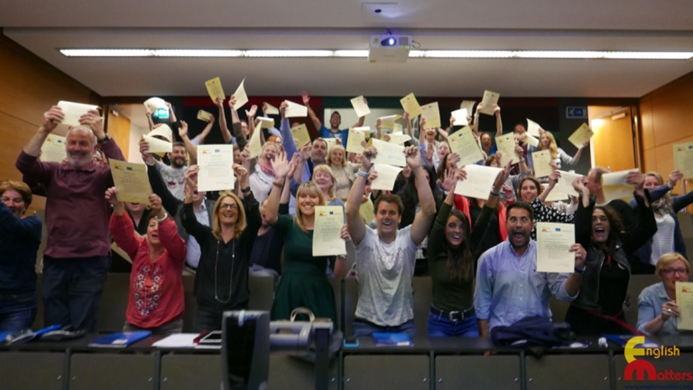Dublin, 20 maggio 2018 – 26 maggio 2018
(Gruppo A: Cosima Dima, Natalina Muscatello, Oreste Fazzi, Rachele Corallo)
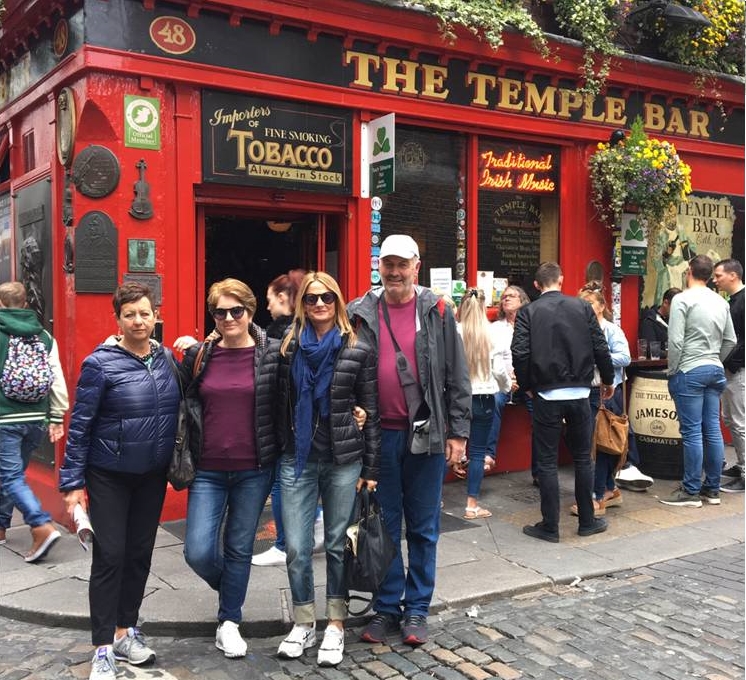
Course program

Diario dell’esperienza

Dal 20 al 26 maggio 2018 insieme a colleghi di altre nazioni abbiamo partecipato al programma ERASMUS PLUS frequentando un corso di METODOLOGIA DIDATTICA per insegnanti di lingua inglese presso il TRINITY COLLEGE, la più prestigiosa e antica università d’Irlanda. Tale corso è stato molto interessante, stimolante e motivante, anche perché tenuto da un’ insegnante molto preparata, Mrs. Anne Marie O’ Brian la quale ci ha fatto analizzare testi di varia natura; letterari, poetici, musicali,…
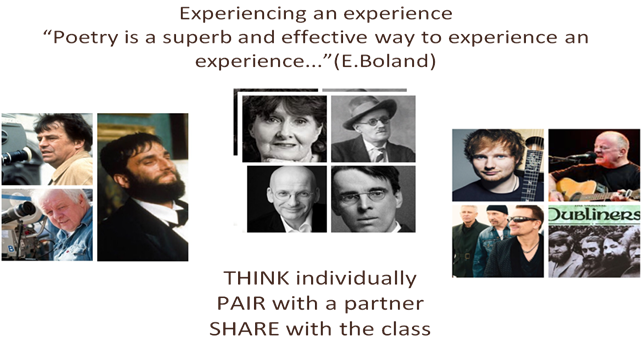
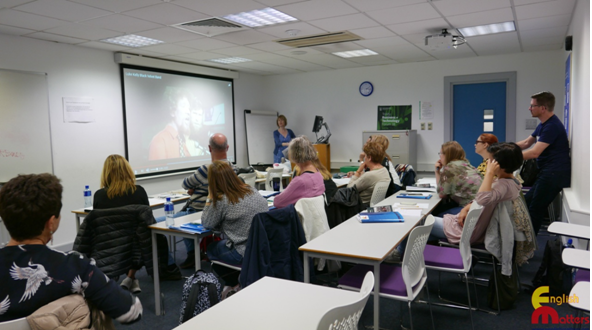
Questo corso è stato svolto nello spirito della più ampia condivisione dei materiali e delle esperienze, puntando molto l’accento sugli aspetti motivazionali oltre che tecnici dell’insegnamento. Nel caso specifico si è discusso delle possibilità di utilizzare materiali e pratiche didattiche innovative, in grado di stimolare l’attenzione e lo spirito d’intraprendenza degli studenti. L ‘approccio metodologico è Inquiry-based Learning, un approccio centrato sullo studente il quale attraverso la ricerca sviluppa le abilità di pensiero. Infatti il valore di questo approccio metodologico è proprio quello di sviluppare la capacità di ricerca e di pensiero critico e soprattutto di aiutare lo studente a diventare indipendente e protagonista del suo stesso apprendimento.
E’ in questo contesto che abbiamo sperimentato un metodo educativo fatto di ricerca-azione, in cui si è posto attenzione a tecniche di insegnamento sperimentandole in prima persona.

E’ stata evidenziata l’importanza del coinvolgimento degli allievi e l’importanza di affrontare tematiche legate al mondo che ci circonda in un ottica di creare maggiore consapevolezza.
Il nostro gruppo classe
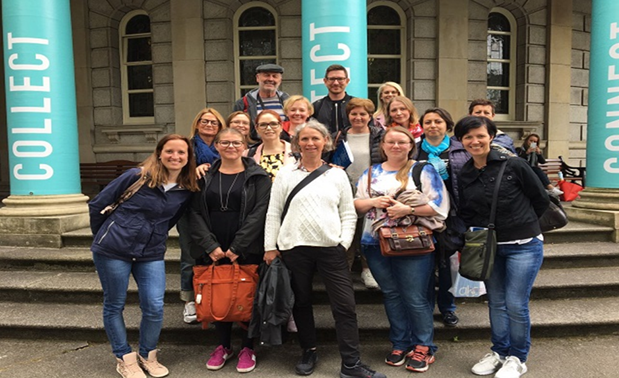
Si è trattato di una settimana densa di studio e immersione nella lingua, nonché di un’esperienza straordinaria dal punto di vista della crescita sia professionale che personale. Abbiamo potuto apprezzare l’umiltà e la professionalità dei colleghi del corso e di avviare futuri rapporti di collaborazione e di confronto.
Quest’esperienza inoltre ci ha dato l’opportunità non solo di approfondire una lingua o a capire come funziona una scuola in un altro paese ma soprattutto a farci riflettere su come “ragionano” le persone in un altro contesto e su come “ragionano” coloro che affrontano l’esperienza di soggiornare in una realtà estranea alla propria che mette in evidenza le nostre capacità ma anche le nostre debolezze. Ciò che abbiamo capito, senza peccare di presunzione, è che il nostro modo di lavorare, apprendere ( e vivere ) non è né migliore né peggiore di quello del mio “collega straniero” e che una presunta chiusura non va affrontata opponendo una presunta superiorità. Questo tipo di esperienza è servita moltissimo per definire la capacità di leggere, interpretare e rielaborare una nuova realtà.

Le attività ricreative tra le quali, sperimentare la tipica danza irlandese o escursioni guidate si sono rivelati ottimi luoghi d’incontro e di confronto sia in relazione ai contenuti linguistici e disciplinari affrontati durante i corsi che ad accrescere le relazioni interpersonali.
Riteniamo di aver avuto la possibilità di vivere un’esperienza eccezionale non solo come formazione personale ma anche come opportunità di entrare in contatto con tante persone e con modi diversi di fare scuola. Sarebbe auspicabile che tutti i docenti facessero, almeno una volta, un’esperienza di dimensione europea. Interagire con docenti europei ci ha dato, forse per la prima volta , la sensazione di essere cittadini europei., uniti tutti dagli stessi problemi , da un’unica lingua e da una forte motivazione all’innovazione.
Diario dell’esperienza ( presentation )
Realizzata con PowerPoint, scarica in formato pdf.
Reflective Journal
Date: 20 May 2018
Venue at Clayton Hotel in Dublin. coordinator of the Organization Partner English Matters whose president Mr.Eduardo Marin welcomed the participants, coming from 11 European countries.
Before the introduction to the programme of the course Mr. Marin once more underlined the importance for us to meet our new “best friends”.
He, then briefly outlined the key moments of the life of the Organization English Matters whose objective is to promote International Learning and the European Dimension in Education , enhancing the power of sharing common ideas and expertise. Subsequently Crash Course on Ireland- “History and Culture” held by Prof. John Kennedy who illustrated the most relevant aspects and moments of the Irish history and culture.
Today’s meeting helped us to reflect on our teaching on the fact that we should be aware and pride of the marvelous job we do.
Date: 21 May 2018
Venue at Trinity College. Mrs. Anne O’ Brien,
Workshop- Time for practice. Modern Irish Writers. Working with texts I ( hands on activities with participants).
Workshop: Inquiry-based Learning (IBL)- Key concepts and Projects (Introduction and Planning): Reading for enjoyment; The Irish Language; Dublin One City One Book; Statues and Sculptures in Dublin City.
Mrs Anne O’Brien gave us interesting glimpses into Irish culture and in particular into the lives and some works of four modern Irish poets: W.B.Yeats, Seamus Heaney, Eavan Bolland, and Paula Meehan. We analysed some of their poetry through group work in which we practised both passive and active tasks. Thanks to the collaborative work and the support of Mrs Brien , these activities gave us useful suggestions about how to use them in the classroom.
The workshop on Inquiry-based Learning has focused on the value of developing students’ literacy skills and learning skills (critical thinking, creative thinking, temwork and communication).
We learnt more about the importance of a student centred approach in order to promote active involvement of students in learning that is relevant, challenging and social. Besides it helps students to become independent and responsible leaners and enables the teacher to assess student understanding of content.
Date: 22 May 2018
Today we set up a workshop about James Joyce and his collection of life stories “Dubliners”. At first we studied his life as a globetrotter and his formation, which had such a great influence on his work, then we listened to and read the short story “Eveline” and analysed it. We also read a small part of a play by a modern Irish playwright, Roddy Doyle, “Paddy Clarke HA HA HA” and appreciated his peculiar sense of humour and his realistic style.
We also dealt with the “coming of age literature”, which has played such an important role in the development of the Irish national identity and studied “Cooperate Learning”, using various types of charts and envisioning how they could be effectively used with our students.
In the afternoon we learnt about many interesting aspects of the life of the great Irish poet William Butler Yeats while visiting the section of the National Library of Ireland dedicated to him.
Date: 23 May 2018
Today’s lesson started with Sean O’Casey. We first worked out some basic information about him, then we read and discussed a small part of his tragic and comic play “Juno and the Paycock”. In this play, also through a pun on words, O’Casey presents a very positive and strong picture of women, who are seen as the real breadwinners in the family because of the inconsistency of men. He also shows his adversion for war, his interest in human rights and his concern for the poor districts of Dublin, which are compared to the slums of Calcutta.
We also studied one of his poems comparing it with another one by Patrick Kavanagh and dealt with language, structure and form.
Later we listened to the songs of some major Irish singers and singer-songwriters and analysed them in groups by comparing two songs on the same topic. This group work was always done with differently mixed groups, which gave us more chances to share and discuss with our colleagues new ideas we could bring back to our classes and to enrich one another.
In the afternoon we did some research work during our visit to the Book of Kells, a “remarkable manuscript”.
Date: 24 May 2018
Today we worked with the Irish cinema and its history from its very beginning until very recently. Relying on common knowledge and surfing the Internet we worked out some biographical information about some important Irish film directors, such as Jim Sheridan and Neil Jordan, actors and actresses and talked about some Irish films, their themes and locations. We also analysed some links between the cinema and the political, social and economic themes it expresses, and the importance of the cinema in the history and the development of the Irish nation also making comparisons with film production from a country where the Irish cultural element is very strong, that is the United States.
We saw a very short but significant part, the beginning of the Irish film “My Left Foot”, directed by Jim Sheridan and we made parallelisms between the Irish cinema and the Irish struggle for independence, represented in such films as “In the name of the Father” or “Michael Collins”.
In the afternoon we met our erasmus friends at the pub “the Merchant” where we spent the night enjoying Irish music and dances.
Date: 25 May 2018
Today we visited the wild and fantastic scenery of Glendalough and the characteristic medieval town of Kilkenny. In both places we enjoyed the outings and the emerald green Irish countryside and learnt something more about Irish culture and history, appreciating the Irish way of life of which the guide’s sense of humour is a vital part, and also having the possibility of spending extra time with our friends and colleagues, going in and out of shops where typical Irish melodies filled our hearts with joy and sipping local beer in a pub.
Date: 26 May 2018
This was the last day, the day of the presentation of our slides. At first we were once more reminded of the importance of sharing good practices and strategies for disseminating what we learnt, disseminating is like scattering seeds: some will certainly bear fruit. Continual input was then given to us about the growing importance of the function of the teacher, who in the past was seen as a problem for society, but now must become the solution, the teacher is an essential agent for society, no improvement is possible without the teacher: this transformation mostly depends on us. There is also an important relationship between dissemination and lifelong professional development.
Then all groups presented their slides about their cultural experience in Ireland and the day ended in an atmosphere of great friendliness and togetherness: the true Erasmus spirit!
A final overview of my experience in this European training programme:
My experience, but it is probably better to say “our” experience in this European training programme has been very useful and stimulating for the following reasons:
Firstly, we have had a unique chance of exploring the main aspects of Irish culture, through literature, music, dance and the cinema, relying on the work of a very good teacher and of breathing the distinguished Trinity College atmosphere, thus increasing our interest in Irish culture.
Secondly, we have met many “new best friends”, with whom we have exchanged and shared experiences and ideas.
Thirdly, we have lived the uniqueness of Dublin’s thriving life both indoors and out in the streets and visited places of historic and geographical interest.
Last, but definitely not least, we have accumulated a little treasure of ideas and practices to bring back to our cultural environment.
The impact of this week of full immersion will undoubtedly have its effects on our teaching and learning approach: yes, it has certainly been a positive experience!
Consegna delle certificazioni finali e saluti
